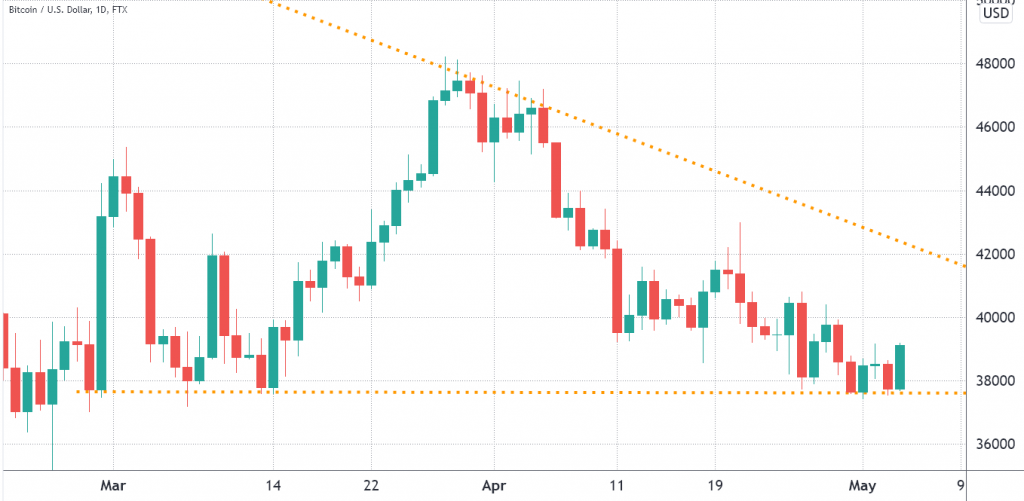Bitcoin (BTC) price has been stuck in a falling wedge pattern for the past two months and during this time it has tested the $37,600 support on multiple instances.
Adding to this “bearish” price action, BTC is down 16% year-to-date, which is in line with the Russell 2000s performance.
The real driver of Bitcoin’s current price action are investors’ concerns of worsening macroeconomic conditions. Professional investors are worried about the impact of the U.S. Federal Reserve’s tightening economic policies and on May 3, billionaire hedge fund manager Paul Tudor Jones said that the environment for investors is worse than ever because the monetary authority is raising interest rates when financial conditions are already worsening.
On May 4, CNBC reported that the European Union implemented new sanctions to phase out Russian crude oil imports within six months and European Commission President Ursula von der Leyen said, “This will be a complete import ban on all Russian oil, seaborne and pipeline, crude and refined.”
For these reasons, traders are increasingly concerned about the potential impact of a global macroeconomic crisis on cryptocurrency markets. If global economies enter a recession, investors will seek protection by moving away from risk-on asset classes like Bitcoin.
Bulls did not expect prices below $40,000
The open interest for the May 6 options expiry in Bitcoin is $735 million, but the actual figure will be lower since bulls were caught by surprise as BTC moved below $40,000.

The 1.22 call-to-put ratio reflects the $405 million call (buy) open interest against the $330 million put (sell) options. Nevertheless, as Bitcoin stands near $39,000, 89% of the bullish bets will likely become worthless.
Meanwhile, if Bitcoin’s price remains below $39,000 on May 6, bears will have $100 million worth of these put (sell) options available. This difference happens because there is no use in a right to sell Bitcoin at $36,000 if it trades above that level on expiry.
Related: BTC price gains 4% pre-Fed as MicroStrategy vows to protect Bitcoin from $21K crash
Bears can secure a $145 million profit on Friday
Below are the four most likely scenarios based on the current price action. The number of options contracts available on May 6 for call (buy) and put (sell) instruments varies, depending on the expiry price. The imbalance favoring each side constitutes the theoretical profit:
- Between $37,000 and $39,000: 500 calls (buy) vs. 4,300 puts (sell). The net result favors bears by $145 million.
- Between $39,000 and $40,000: 1,200 calls (buy) vs. 2,500 puts (sell). Bears have a $50 million advantage.
- Between $40,000 and $41,000: 3,800 calls (buy) vs. 1,100 puts (sell). The net result favors bulls by $105 million.
- Between $41,000 and $42,000: 5,300 calls (buy) vs. 700 puts (sell). Bulls boost their gains to $190 million.
This crude estimate considers the call options used in bullish bets and the put options exclusively in neutral-to-bearish trades. Even so, this oversimplification disregards more complex investment strategies.
For example, a trader could have sold a call option, effectively gaining negative exposure to Bitcoin above a specific price, but unfortunately, there’s no easy way to estimate this effect.
Bitcoin bears need to sustain the price below $39,000 on May 6 to secure a $145 million profit. On the other hand, bulls can avoid a loss by pushing BTC above $40,000, enough to net them $100 million in gains. Considering the bearish macroeconomic conditions, bears seem better positioned for Friday’s expiry.
The views and opinions expressed here are solely those of the author and do not necessarily reflect the views of Cointelegraph. Every investment and trading move involves risk. You should conduct your own research when making a decision.


